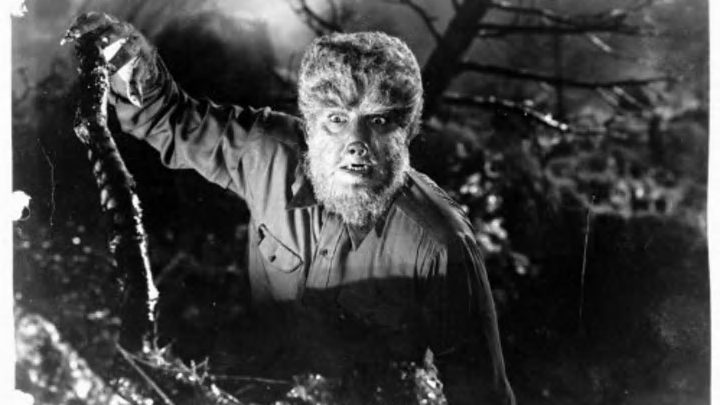While other Universal Monsters have sympathetic stories, especially Frankenstein's Monster, few convey otherness as much as Larry Talbot, also known as The Wolf Man (Lon Chaney Jr.). With Leigh Whannell's Wolf Man set to howl in theaters this weekend, now's a great time to revisit the 1941 film and explore its themes of otherness, including the impact of WWII on its writer, Curt Siodmak, a Jewish man who fled to the U.S. to escape persecution.
From the outset, the parallels between what Jewish people faced in Nazi Germany and Larry's plight are evident. The film opens with a close-up of an ancient text detailing the mark of the werewolf. It includes a five-pointed star, like a pentagram. This also resembles the Star of David. When Larry is bitten early in the film, he eventually bears the mark on his chest, making him an outcast and drawing the townspeople's suspicion.
Even prior to the bite, Larry is associated with the symbol. While flirting with his love interest, Gwen (Evelyn Ankers), at an antique shop, he purchases a silver handle featuring the wolf symbol. Gwen warns him that the image is associated with the werewolf, but he doesn't care and dismisses it.
The Wolf Man's address of otherness is no coincidence. Siodmak's New York Times obituary
includes a quote from him that states, "I am the Wolf Man," before adding, "I was forced into a fate I didn't want: to be a Jew in Germany. I would not have chosen that as my fate. The swastika represents the moon. When the moon comes up, the man doesn't want to murder, but he knows he cannot escape it, the Wolf Man destiny.''
Siodmak's quote is interesting because it depicts the Wolf Man as both victim and murderer. Larry Talbot can't escape his fate, nor can he quell his murderous impulses. Even before he transforms into a wolf, he kills a Romani fortune teller named Bela (Bela Lugosi) by brutally bludgeoning her with the cane, which causes the bite. To be fair, Bela was in wolf form, but the scene is prolonged and quite shocking.
Unfortunately, there is no escape for Larry Talbot. His story begins and ends in sorrow. He only returns to his family's estate because his older brother died in a hunting accident, so the care of the estate falls upon him. At one point, Gwen's actual fiancé, Frank Andrews (Patric Knowles), notes that there's something very tragic about Talbot. He also refuses to shake his hand, again othering Larry, before he tells Gwen that he couldn't help but notice the wolf handle and star on Larry's cane.

Larry's fate only worsens when the townspeople hunt him down in the woods, in true Universal Monsters fashion. He dies at the hands of his very own father (Claude Rains), who doesn't know that the Wolf Man is his son. Larry's struck down by the same cane that he used to kill Bela. It's a haunting, poetic, and sad ending for one of Universal's most well-known monsters.
Besides Larry's association with otherness, there's also the depiction of the Romani people. As soon as they're introduced, they're linked to the Old World and superstitions. In fact, the set design changes from city streets to a foggy landscape with gnarled trees and stunning gothic backdrops. Larry then meets Bela and his mother, Maleva (Maria Ouspenskaya), who eventually explains the werewolf curse.
Like Larry, the Romani people are scorned by some townspeople, who decry their traditions. Similar to the Jewish people, Nazis targeted the Romani people for extermination. According to the Holocaust Encyclopedia, a resource of the United States Holocaust Memorial Museum, beginning in 1933, the Nazis started persecuting the Romani people in Germany, forcing them into internment camps. It's estimated that the Nazis murdered at least 250,000 European Roma, but the number could be as high as 500,000.

Considering these facts, it's no surprise that Siodmak created Romani characters and used them as an integral part of the story. Larry Talbot eventually has more in common with them than his flesh-and-blood family. He learns the full extent of the curse and his otherness through them. Meanwhile, Maleva, more than any other character, tries to protect and save Larry, giving him a pendant at first to break the curse before encouraging him to run. She understands the danger Larry poses but also how their society shuns anyone deemed different.
Lon Chaney Jr.'s performance as the Wolf Man remains a horror staple because he's a tragic figure who embodies otherness. The film works well because it draws upon Siodmak's lived experience as a Jewish man living during World War II. Larry Talbot's story and curse is heartbreaking, and Chaney Jr. plays it perfectly with great pathos.
The Wolf Man is currently streaming on Peacock.
